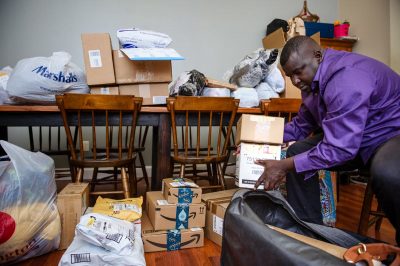The Secret Behind Amazon Package Delivery to West Africa

Boxes arrive at all hours, ordered from websites around the world. Throw pillows, diapers, car parts, cellphones, high heels and AirPods pile up in the foyer, but none of the items were bought by the person to whom they are addressed: Arame Wade.
The true recipients are 3,800 miles away.
Every few weeks, Ms. Wade stuffs her luggage with goods and hauls them across the Atlantic to the people who actually made the purchases: customers in Dakar, Senegal, in West Africa, who pay her a fee.
Ms. Wade, a former car saleswoman, is part of a thriving low-tech solution to a problem that continues to bedevil high-tech shopping in places where mail delivery is unreliable and street addresses are rare: Getting stuff to the people who ordered it.
The roundabout shipping route is an attempt to solve what is known among logistics professionals as the “last-mile issue”: getting imported online goods into Senegal can be fairly smooth, but the final stretch is where things sometimes go awry.
Informal couriers like Ms. Wade, 34, are known in Senegal and other French-speaking countries as G.P.s.
The term, many people say, has its origins in an Air France policy that offered family members of airline employees a reduced airfare called gratuité partielle, or partially free. The G.P.s would often bring hard-to-find goods home from abroad for friends.
Today, G.P.s have formed their own cottage industry, charging fees — as little as $8 a pound for some bulk items; more for things like cellphones or computers — that are typically well below what most online retailers charge for shipping.
“You’re crossing fingers that you get these items home safely, and nothing breaks and nothing gets stolen,” Ms. Wade said. “I like the freedom of it, you’re making your own schedule,” she added. “It comes with a lot of comfort, but no peace of mind.”

Jumia, a Pan-African e-commerce start-up once hailed as the “Amazon of Africa” that tried to use local expertise to solve the last-mile conundrum, began closing operations in almost half a dozen countries in the past few months.
Amazon ships goods to Senegal and 128 other countries, where it assumes the risk and responsibility for deliveries, much as it does in the United States, according to the company.
But the shipping companies that Amazon uses cannot always provide doorstep delivery. The retail giant is making strides. In the Himalayas, for example, it has teamed up with small businesses to deliver directly to customers’ doors.
Still, many people in West Africa choose the underground network, simply because they prefer to use someone they know.
Marietou Seck’s house, like many in the Senegalese capital, has no street number. So Ms. Seck, 34, a sustainability consultant who orders things online for her two small children has cultivated a stable of G.P.s.
She has one to turn to in every region she orders toys from, like Canada, and France, where she shops online for educational French-language games.
At checkout, she types in the addresses the couriers provide in their home countries. When they land in Dakar, they call her cellphone and arrange to meet so that she can collect her purchases.
“You don’t give your stuff to any G.P.,” Ms. Seck said, adding that she asked for references and checked online reviews. “They will say, ‘O.K., she is good,’ or ‘She comes late’. If it’s a tardiness issue, that’s O.K. But a trust issue? I won’t use her.”
Alioune Sine’s sister has been delivering American goods to Senegalese clients for two decades. Mr. Sine, 44, a filmmaker who helps with his sister’s business, said that they had gotten busier with the rise of e-commerce and recruit friends and cousins to help transport more suitcases.
G.P.s often operate on slim profit margins. They hunt for low-priced tickets: Up to $1,300 is viewed as acceptable for a round-trip flight from New York to Senegal. But to retain customers, many of the couriers continue to fly even when prices spike during the holidays, and the economic math becomes precarious.
Airlines typically allow an international passenger to check two pieces of luggage with a ticket. On a Delta Air Lines flight to West Africa, for example, it costs $200 for each extra piece of baggage weighing up to 70 pounds.
On Delta, Mr. Sine said, his family company’s shippers take the maximum number of bags: 10.
“When we get to the airport, we get one big hand truck, and it’s back and forth, back and forth,” Mr. Sine said on a recent morning at a barbershop in Harlem where the company rents an office. He was sorting through bundles of brightly colored African clothing, calling the phone numbers of customers written on each, telling them to come pick up their packages.
G.P.s tend to carry fewer bags, and make less money, on return trips, when they carry mostly lighter items like custom traditional boubou dresses.
Many Senegalese people do not have credit cards, so some couriers like Mr. Sine will buy products for their customers, and accept cash on delivery as repayment. Most of his sister’s clients are friends or distant family members.
“Everybody has to trust each other,” he said. “That is how we do business.”
Some couriers take steps to comply with customs regulations by requiring customers to pay duties on the goods that they carry. Others try to go undetected. They all emphasize the need to open, inspect and reseal packages when warranted, to make sure that they know what they are carrying.
G.P.s are not foolproof: Luggage can get lost, and couriers sometimes have to reimburse clients from their own pockets when that happens. After losing a suitcase of expensive electronics, Ms. Wade said that she now ferries just one or two iPhones at a time.
She said that the pitfalls and high price of plane tickets had cut into her profits and that she had made more at the car dealership. But there were other benefits to her new line of work, like twice-a-month visits to her great-aunt, whose house in Dakar she uses as a distribution center.
“Before I leave I will call her and tell her the date that I want to come, she will pray for me, and make my favorite dish,” Ms. Wade said. “She hates to see me go.”
Aly Thioye, a Domino’s Pizza franchisee who is originally from Senegal, said he had started his courier business two years ago as a way of paying for his visits back home.
Now demand is such that he often makes the journey from Logan International Airport in Boston to Blaise Diagne International Airport in Senegal every other week.
This month, he said, he had flown back and forth twice in just over a week, his bags filled with presents for Christmas, which is widely celebrated in Senegal even though it is a predominantly Muslim country.
“I would love to stop at this point, but I can’t really stop,” Mr. Thioye, 40, said. His revolving group of about 50 customers are relatives and friends, and, he added, “they have come to rely on me.”
As each departure date nears, his apartment in North Smithfield, R.I., is jammed with Apple Watches, piles of trendy women’s outfits and car bumpers that he stuffs into long duffel bags.
“It’s taken over me,” Mr. Thioye said recently, as he readied for yet another trip. “I just come home and my house is full of boxes, and my wife says, ‘You’ve got to get these out of there!’” (New York Times)

